Republican Candidates For President Clash In Fourth Debate
Last night's debate in Wisconsin was arguably the most substantive we've seen so far between the Republican candidates, and one that displayed quite starkly the policy differences between them.
The Republican candidates for President met last night in Milwaukee, Wisconsin in their fourth debate of the Presidential cycle, and it was perhaps among the sharpest debates of the one’s we’ve seen so far, with candidates clashing in ways we haven’t seen until now:
MILWAUKEE — After weeks of personal sniping, the Republican presidential candidates clashed sharply over immigration and other policies in their debate here on Tuesday, with Gov. John Kasich of Ohio and former Gov. Jeb Bush of Florida trying to energize their campaigns by heaping scorn on Donald J. Trump’s plan to deport unauthorized immigrants.
In the most substantive Republican debate so far, Mr. Kasich and Mr. Bush, who have been fading in polls, presented themselves as experienced chief executives who had practical solutions to deal with national challenges like immigration. Yet Mr. Trump and another candidate, Senator Ted Cruz of Texas, inveighed against what they called amnesty and argued that undocumented workers were driving down Americans’ wages.
The splintering over immigration, in a campaign dominated so far by the personas, speeches and backgrounds of the candidates, illuminated the brightest dividing line between Republican hopefuls like Mr. Bush and Mr. Kasich, who favor a comprehensive immigration overhaul, and the many primary voters who have embraced Mr. Trump’s harsh language about immigrants in the country illegally.
While several other candidates, like Senator Marco Rubio of Florida and the retired neurosurgeon Ben Carson, received a pass from the moderators on immigration, Mr. Kasich took on the issue directly after Mr. Trump defended his plan to build a wall along the Mexican border and to identify and deport some 11 million people.
“Think about the families; think about the children,” Mr. Kasich said. “Come on, folks, we know you can’t pick them up and ship them across the border. It’s a silly argument. It’s not an adult argument.”
Mr. Trump, whose counterpunches were a memorable part of his early debate performances, replied coolly at first, citing President Dwight D. Eisenhower’s approach to deporting immigrants in the 1950s.
“You don’t get nicer; you don’t get friendlier,” Mr. Trump said. “We have no choice. We have no choice.”
But Mr. Kasich stayed on the attack. “Little false little things, sir, they really don’t work when it comes to the truth,” he said.
Mr. Bush then tried to pounce. He twitted Mr. Trump, his longtime rival in the race, for suggesting that Mr. Bush be allowed to speak — “What a generous man you are” — and warned that Mr. Trump’s harsh proposals would drive Hispanic voters to support the Democratic candidate Hillary Rodham Clinton.
“They’re doing high-fives in the Clinton campaign right now when they hear this,” Mr. Bush said.
But policy details and disagreements, for the most part, replaced nasty potshots in the early going on Tuesday night, laying bare real fissures within the Republican Party on immigration, national security, trade and the meaning of being a conservative. The candidates used the 90 seconds they were allotted for each answer to promote their tax proposals, to lament what they said were intrusive business regulations and to delve into the country’s monetary policy. Even when Mr. Kasich sought to speak at one point when he was not called on, it was because he wanted to discuss a value-added tax.
Mr. Rubio was not only able to avoid being drawn into the contentious immigration debate, but also repeatedly received questions that allowed him to answer with versions of his stump speech. Even he seemed unable to believe his good fortune when he was asked to make his case against Mrs. Clinton. He chuckled for a moment before unspooling a well-rehearsed argument: why he can prosecute a “generational” case against her.
“If I am the nominee, they will be the party of the past, and we will be the party of the 21st century,” said Mr. Rubio, 44.
Less than three months before Iowa begins the Republican nominating contest, the jostling in Milwaukee reflected the growing urgency the candidates feel to stand out in a sprawling 14-person field. With a pair of political novices, Mr. Trump and Mr. Carson, atop the polls, the other candidates appeared determined to remain in the campaign until there is more clarity on who is likely to be the nominee. But the muddled picture is clearly starting to unnerve many in the party.
Some of the candidates expressed this frustration and sought to distinguish themselves by speaking more aggressively about their plans to cut taxes or create jobs — even if they did not deliver many specifics.
They barely explored recent controversies roiling the Republican race, particularly accusations that Mr. Carson had embellished or even fabricated part of his inspiring life story. Asked if he was worried about those questions, Mr. Carson drew strong applause from the audience by criticizing the news media as biased against him.
“The fact of the matter is, we should vet all candidates,” Mr. Carson said. “I have no problem with being vetted. What I do have a problem with is being lied about.” He then accused Mrs. Clinton of initially lying about the motives of the terrorists who killed four State Department employees in Benghazi, Libya, in 2012, and charged that the news media had not held her accountable. As for himself, he said, “People who know me know that I’m an honest person.”
Mr. Rubio, who delivered the strongest performance in the October debate, has been struggling since then to put to rest questions about his personal finances, with the Bush campaign and Mr. Trump portraying him as irresponsible. But that issue did not surface Tuesday, and Mr. Rubio largely skated above the sharpest clashes in the debate.
Mr. Bush, who clashed memorably with Mr. Rubio in the debate last month, strained Tuesday to show skeptical donors and voters that his campaign is still viable, ignoring Mr. Rubio and instead repeatedly attacking Mrs. Clinton on fiscal issues.
“Hillary Clinton’s approach to this is more top-down, more regulation, more taxes, more government, and it will destroy our economy,” Mr. Bush said.
Several other candidates also focused more on Mrs. Clinton than on their rivals. Mr. Kasich, who had declined to attack her in the first months of his campaign, joined in, saying, “It will be a disaster if she got elected.
Some of the most striking moments came as candidates revealed more of themselves than in previous debates.
Senator Rand Paul of Kentucky, who had perhaps the best night of his campaign, delivered a sophisticated explanation of his libertarian-leaning views on foreign policy. And he made a forceful case about conservatism, portraying Mr. Rubio as a big spender who would not adhere to small-government values.
“Marco, how is it conservative to add a trillion-dollar expenditure for the government that you’re not paying for?” Mr. Paul asked, citing Mr. Rubio’s proposals for higher military spending.
Mr. Rubio responded by calling Mr. Paul “a committed isolationist,” and won one of the loudest ovations of the night by defending American leadership.
“I know that the world is a safer and better place when America is the strongest military power in the world,” Mr. Rubio said.
Mr. Paul did not relent in the face of the applause, responding, “I don’t think we’re any safer from bankruptcy court,” and asking Mr. Rubio how he could be “a conservative and be liberal on military spending.”
The Washington Post highlights the clashes as well:
MILWAUKEE — The leading Republican presidential candidates clashed sharply over immigration policy, military spending, and other intractable and emotional issues in a debate here Tuesday night, bringing into sharp relief the party’s fault line between rigid conservatism and mainstream practicality.
The two-hour debate spotlighted the rift between the outsider candidates and establishment governors over how strictly to enforce immigration laws and whether to provide a pathway to legal status for the country’s more than 11 million undocumented immigrants or deport them.
It also revived a long-simmering dispute over the size and role of the U.S. military, with Sen. Rand Paul (Ky.) warning of the potential adverse fiscal effects of increased defense spending and Sens. Marco Rubio (Fla.) and Ted Cruz (Tex.) advocating a more muscular American military presence in the world.
Overall, however, it was a relatively cerebral affair. In a marked departure from the three previous debates, Tuesday’s questions prodded the candidates to explain their positions on such substantive issues as tax policy, the minimum wage and trade treaties, rather than draw contrasts with one another.
Little attention was paid to the personal attacks that have shaped the race in recent weeks. On the campaign trail, billionaire Donald Trump has harshly assailed Ben Carson as the retired neurosurgeon rose in the polls, but Trump refrained from hitting his fellow front-runner on the debate stage.
Similarly, former Florida governor Jeb Bush, whose attack on Rubio backfired at the Oct. 28 debate, did not strike his onetime protege on Tuesday night. Instead, he focused his rhetoric on President Obama and Democratic front-runner Hillary Rodham Clinton, delivering a few punchy answers in a performance that was not dominant but was more energetic than his earlier lackluster showings
Of all the Republican debates so far, I will honestly have to say that last night’s engagement was the most substantive exchange between all the candidates that we’ve seen to date. Perhaps it’s because the Fox Business Network got the message from the disaster that was the CNBC debate two weeks ago, perhaps it was the fact that there were fewer people on the stage in the main debate and that allowed more detailed discussions that didn’t devolve into shouting matches and candidates repeating talking points. Whatever the reason was, though, I don’t really have an issue with saying that this debate was the best that we’ve seen so far and that it should serve as a guidepost for those going forward. As promised, the questions from the moderators in both the early debate and the prime time debate focused almost exclusively on the economy, and dealt with everything from tax plans, entitlements, and budget priorities to monetary policy, trade, and the economic impact of immigration. Whether you liked the answers the candidates gave or not, and there was a lot said on the stage in both debates last night that I disagreed with on a substantive level, there’s little question that there was plenty of policy “meat” last night even if the responses that candidates often gave were vague, nonsensical, or tended to reveal the significant gaps in their knowledge about policy and politics (yes, I’m looking at you, Ben Carson).
Like the last debate, it’s hard to pick a single winner from last night’s clashes,
In the early debate, New Jersey Governor Chris Christie clearly stood out on the smaller stage but much of that had to do with the fact that he was standing next to Mike Huckabee, Bobby Jindal, and Rick Santorum. With Christie out-sized, assertive personality and his reputation, it wasn’t at all surprising to see him outshining them on several occasions over the course of the hour that was given to the four low-polling candidates. For all four of these people, though, this undercard debate seemed as though all of them realized that this may very well be their last chance to make their case before a national audience. So far, CNN has not said whether there will be an undercard version of the debate they will be hosting in December and if there is not then the low-polling candidates will have to rely on their own campaigns, and whatever media coverage they can garner to try to turn their campaigns around before people actually start voting in February. The question for Christie, or any of these candidates really, is whether anything that happened last night will be enough to give their campaigns a boost. With the exception of Carly Fiorina’s performance in the first undercard debate, none of the candidates that have appeared in these early debates have seen an appreciable increase in their poll performance. Indeed, Rick Perry, who appeared in the same undercard debate that Fiorina did back in August saw his numbers continue to fall just as they had all summer, to the point where he ended up deciding to withdraw just days before he would have been eligible to participate in the second undercard debate. In Christie’s case, while he had fallen nationally his poll numbers in New Hampshire have been on the upswing in recent weeks. Whether that continues, and whether it’s reflected in national polling enough for him to be eligible for inclusion in the prime time debate in December remains to be seen. Whatever the answer to that question is, though, it can be said that Christie didn’t leave anything on the stage last night and that he did his best to try to get back on the main stage itself.
As for the main stage debate, as the Times and Post summaries above both make clear, the policy clashes between the candidates were far sharper than we have seen to date, and that led to some very interesting moments that are likely to shape the nature of the debate among the top and middle tier candidates in the race going forward. Some of the sharpest exchanges of the night were on the issue of immigration, with candidates such as Jeb Bush and John Kasich clashing with Donald Trump over the issue of what to do about the eleven million or more people who are in the country illegally. Kasich in particular hit strongly upon the point that the idea of deporting all of these people, many of whom who have children who are American citizens by virtue of their having been born here, was not only impractical but inhumane. Jeb Bush made similar points and, somewhat remarkably, the audience reaction to both Kasich and Bush on those points seemed to be more positive than you might have expected in a Republican debate. Time will tell whether this has any impact on their relative standing in the polls, and one suspects that it won’t and that Trump’s anti-immigrant stances will continue to win the day among likely Republican voters, but at the very least the battle was joined on the stage last night in a way we had not seen in past engagements.
Perhaps the most interesting, and potentially meaningful, exchanges last night took place between Senators Marco Rubio and Rand Paul. The two candidates, one of whom is seeing his star rise in polls and among donors and the other who has struggled for months now, clashed on a number of issues ranging from taxes and tax subsidies, to foreign policy and military spending. Both candidates hit well on the themes of their campaigns and the contrasts that they wish to draw between each other, and their respective bases were no doubt pleased with what they heard. Beyond that, though, it’s possible that others viewing the debate saw for the first time that there really are differences between the candidates running for the Republican nomination. Obviously, Paul has more at stake here than Rubio given the fact that he has been heading south in the polls while Rubio is heading north, and his deviations from Republican orthodoxy on foreign policy and military spending may actually end up hurting him in the race. However, the distinctions were drawn and those who watched can’t say that they didn’t get a full view of a real difference between at least some of the men on the stage.
As for the rest of the candidates, it strikes me that all of the candidates on the main stage did well, many of them better than we have seen in the past. Jeb Bush, who came out of the last debate with even many of his own supporters wondering where his campaign would be going after what seemed like a weak performance that included an odd and seemingly misguided attempt to attack Marco Rubio, did much better this time around. Whatever happens to Bush’s poll numbers in the short term, last night should at leave have calmed the concerns of donors about his campaign, and that will likely mean that he’ll live to fight well into the early primaries. Ted Cruz and Carly Fiorina seemed somewhat of afterthoughts last night, but both turned in performances that are likely to be received well by voters going forward as well. The same goes for Ohio Governor John Kasich, who did well in response to questions about the Federal budget and taxes, both areas that were well within his wheelhouse when he was a Member of Congress in the 1990s and have been a central part of his time as Ohio Governor. Ben Carson came across as, well, Ben Carson. He continues to demonstrate that his understanding of policy issues is cursory at best, and he shows no real ambition to talk about details in any real sense of the word. That doesn’t seem to be hurting him so far, though, so I’m not sure that it’s going to matter of this point. Finally, Donald Trump was once again less of an out-sized presence in this debate than he had been in the first two debates, but it almost seems as though this is helping him more than it hurts him, perhaps because less time on camera means less time for him to say things that end up backfiring on him. For both Carson and Trump, though, it seems likely that they will maintain their front runner positions after this debate unless voters really start changing their priorities
We’ll start seeing what impact this debate will have on the race once the first polls come out in the coming days, but my guess will be that the impact will be minimal at best. Trump and Carson, I think, will stay at the top of the field while we may see candidates like Rubio and Cruz inch up a little more to the point where they start looking at real contenders to take on the guys at the top. The people in the middle of the field — Bush, Kasich, and Fiorina mainly — will probably stay where there are, which is about the best they can ask for right now. The candidates to watch will be Rand Paul and, as I noted above, Chris Christie, Both of them needed their respective poll numbers to increase after last night if their campaigns are going to remain viable. It strikes me that they both did the best they could to make that happen and, now, it’s just a matter of waiting to see if it worked.
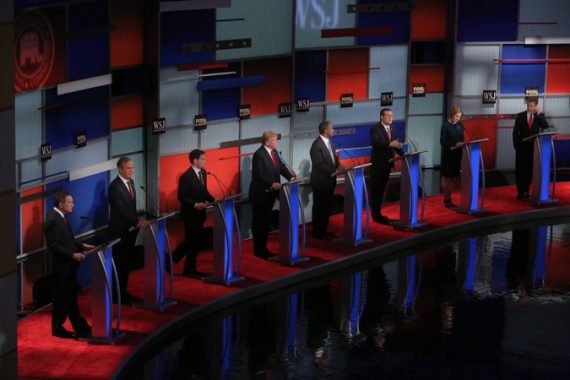

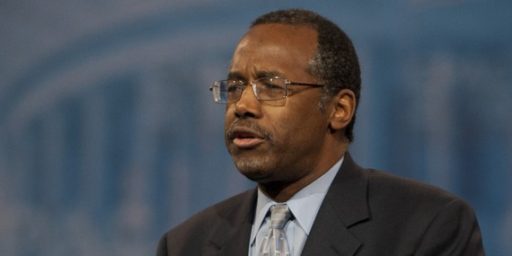
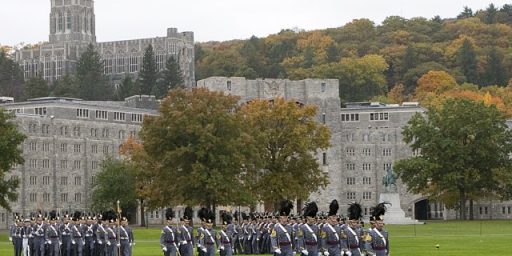
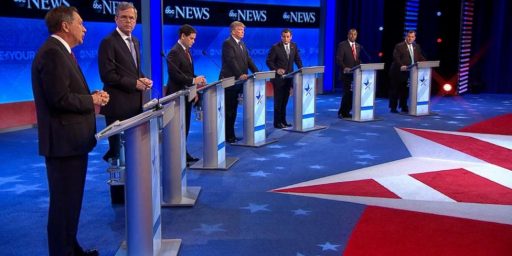
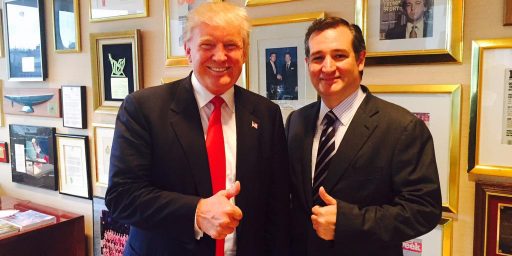
I can’t wait for the eventual Republican nominee to try painting Hillary as some kind of radical peacenik who wants to disarm America, withdraw from the world, and [insert neocon catchphrases here], when in reality her foreign policy views would fit in quite well on their stage amongst Rubio, Bush, Cruz, Fiorina, etc.
The party of tax cuts forever tries to paint the other party of bribing the population with freebies. Seriously?
What I find about these debates is that while some differences are emerging on policies, there is little beyond “this is my opinion” on policy. For an economic discussion, the unwillingness of the moderators to do any kind of followup on economic policy (do the numbers add up? Gold standard, really? impact of too large to fail banks failing? etc.) It is still all talking points. And frustrating as well.
I do not think that word, substantive, means what you think it means.
@Argon:
“The party of tax cuts forever tries to paint the other party of bribing the population with freebies”
But that’s bribing the deserving rich, not those other people.
My favorite moment of the debate was Rand Paul kneecapping Donald Trump. After a long rambling rant about the TPP and China, Paul pointed out that China isn’t part of the TPP, which basically trashed the entire minute-long diatribe from Trump.
I thought Ted Cruz “won” last night. He was firm and quite clear on his positions. Rubio just seems unctuous and cringe-y. Jeb Bush, as clunky as he is, is not going away. John Kasich came off as too adult to get there. Carson? Once people who support him get past their hangover, Carson will be toast.
I do still, I continue to believe that – excepting Carson – the other 4 will be there at the end.
@Scott: Yeah, the real difference seems to be only the size of the deficit added by their various irresponsible tax plans.
Out of curiosity, has anyone ever heard a national Democratic politician talk about ‘the meaning of being a liberal”? Or whether the other guy’s plan is bad because it’s not liberal?
@Argon:
It’s because they’re bribing poor people for their votes. Money given by the rich to politicians is just a worthwhile investment.. #TCOT
Enjoyed how philosophy became the boogeyman in some parts of the debate.
But I wonder when he is going to called out on his economic quackery. He is in Ron Paul territory. He implies that boom and busts are caused by the Fed as if there weren’t worse gyrations under the gold standard. He is either shameless or illiterate or both.
@Scott:
I generally agree with you. However, if this actually is an election wherein base Republicans finally get their no-more-excuses chance – that is, no RINO candidates like McCain, Romney – then Ted Cruz will be in it right up to the convention.
I believe the arson-types are trying to figure out if Rubio can at least fake it enough to be acceptable to the burn-it-down crowd. Rubio is doing his damned-est to distance himself from his RINO-like bipartisan immigration proposal, I’m not sure it works with the arson-types. If they want to win at all costs, then the unctuous Rubio can win the nomination.
It seems to me that the GOP is going to have to do anything it can to avoid having to talk about tax cuts and government spending. There’s just no passion or conviction left to splurge on either.
Carson told a big lie that’s going to be repeated incessantly over the next 12 months, so it should be addressed. He said this:
Where did he get the wacky idea that “terrorist attack” and ‘motivated by the video’ are mutually exclusive?
Carson did a good job of summarizing the GOP narrative, which is based on a fallacy. It’s a fallacy (known as the fallacy of bifurcation) to pretend that it had to be either “a video” or “a terrorist attack,” as if these two things are mutually exclusive. They are not. There was a terrorist attack, and it was motivated by the video. There’s plenty of evidence that the attackers were motivated by the video. A good place to start is here.
Mike Huckabee had a good statement concerning the VA: if members of Congress had thexsame health plan as veterans, there would be some quick changes.
I would say that the same thing could be said for the federal “affordable health care” plan.
A little insecure? And sharpness among the four GOP debates isn’t even a high bar to jump. I am still reminded of a comment a friend made describing the Presidency as “an endless parade of doofuses–each one more hapless than the previous.”
@Jim R: Me too! My biggest reservation about Hillary is that her foreign policy stance seems to be that when you are “waist deep in the big muddy” the thing to do is “push on.”
@Tyrell:
Gadzooks, man…members of congress already have to buy their insurance thru the Obamacare marketplaces…solely because of a Republican sponsored amendment.
How can you be soooo, so, so, so, against Obamacare, when you clearly don’t understand it?
Maybe you should learn more, and then form an opinion, rather than believing what a pack of proven liars tells you to think?
Trump:
Seriously? A guy inherited a fortune from his daddy, and receives massive amounts of corporate welfare, is complaining that my wages are too high?
GTFOH
@Tyrell: While I agree with you about changes happening, I happen to live in a state where the plan is working well because we have an evil Democratic administration countered by venal self-serving Republicans in a legislature that wants to rip off the Federals for as much of our money back as we can get. Buying in an environment where the plan that I have has premiums that are half of what the same plan offered by COBRA 15 years ago (and that doesn’t even account for the generous subsidy that I get because I wouldn’t be able to afford insurance at all without it) seems like a pretty good deal to me.
I still like the single payer plan that we had in Korea while I was living there, though. It had a good balance of provisions for the basic health care of all while trying to keep expenses down for everyone
Holy buckets is that a scary debate to watch. Here’s my run-down of the candidates and their prospects in the primary:
John Kasich – No chance. Too adult. Too much compromise, too much “doing the rational thing” instead of “doing the anti-Obama thing”. He would also be one of the best bets the Republicans would have in the general. His answer on the bailouts will hurt him too, since he obviously favored them but didn’t feel he could say that…just own it, dude.
Jeb Bush – Semi-adult. Still came across as conservative, but he’s not aggressive enough to get at the meat of the party. He tried some comedy (and failed), used a lot of Democrat-slamming, and at least had something to say about taxes and economics. But like Kasich (though certainly not to that degree) he’s too reasonable for his own good.
Ted Cruz – Please stab out my eardrums if he gets through. The guy looks halfway like Nixon and sounds halfway like W. No clue on foreign policy, limited ideas about taxes and economics, but he’s trying his darndest to come across as likeable.
Marco Rubio – Plain vanilla, blowing with the wind. No originality, no personality. Even his closing remark sounded like he was trying to take Ted Cruz’s.
Donald Trump – Is Trump. He’s obsessed with his wall and deportation, and I think that’s going to kill him eventually. He looked like an angry old man in this debate.
Carly Fiorina – ??? She thinks the tax code can be 3 pages long. She thinks a multi-trillion dollar economy spanning all industries in vastly different regions can be run by revenue generation dictated by 3 pages of regulation. How did she become CEO of a company again?
Ben Carson – He’s running on a dare, right?
Rand Paul – His obsession with penny-pinching the US government into non-existence is a recipe for national disaster, so at least he’s open about it. And he’s (theoretically) keeping the other guys honest about their budget plans? Also, he said “Democrat Party”, which made him sound like an internet troll.
@ptfe:
Well…no matter how she managed to get the job…she failed miserably at it.
It continues to be Snow White and the numerous Republican Dwarfs….